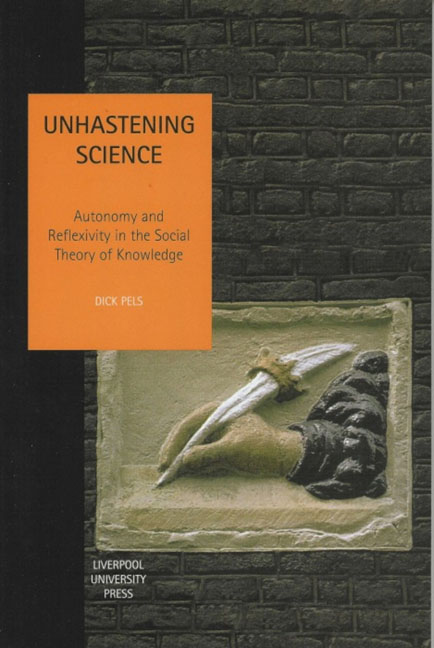Book contents
- Frontmatter
- Dedication
- Contents
- Acknowledgments
- 1 The Timescape of Science
- 2 What (Again) is So Special about Science?
- 3 Two Traditions in the Social Theory of Knowledge
- 4 The Natural Proximity of Facts and Values
- 5 Knowledge Politics and Anti-Politics: Bourdieu on Science and Intellectuals
- 6 The Politics of Symmetry
- 7 Reflexivity: One Step Up
- 8 Intellectual Autonomy and the Politics of Slow Motion
- Epilogue: Weak Social Theory
- Notes
- Bibliography
- Index
Epilogue: Weak Social Theory
- Frontmatter
- Dedication
- Contents
- Acknowledgments
- 1 The Timescape of Science
- 2 What (Again) is So Special about Science?
- 3 Two Traditions in the Social Theory of Knowledge
- 4 The Natural Proximity of Facts and Values
- 5 Knowledge Politics and Anti-Politics: Bourdieu on Science and Intellectuals
- 6 The Politics of Symmetry
- 7 Reflexivity: One Step Up
- 8 Intellectual Autonomy and the Politics of Slow Motion
- Epilogue: Weak Social Theory
- Notes
- Bibliography
- Index
Summary
Feel the Force!
Philosophy and science, including social science, have always been strongly attracted to strength. Reason has always sought to be a force, denying its own politics of knowledge in order to become that much harder to beat. Epistemology has been a war machine, wielding logical proof and an all-purpose methodology as its main pieces of ordnance. The whole point of Truth is, of course, that it is compelling and compulsory, that you cannot escape from it, that it has an inherent tendency to spread, and that there is something seriously amiss with the unconvinced or recalcitrant (‘Surely you can't deny that …’). It is closely allied to the classical ambition to know the world in toto with total certainty. Nowadays, of course, we no longer want our truths to be absolute, immediate reflections of eternal Platonic Forms; we are prepared to let our doubts creep a little further than Descartes, who doubted only for a brief moment before fastening upon great and indubitable certainties. A small weakness crept in when Popper dared to replace the metaphor of the rockbottom of science with that of the ‘swamp’, but foundationalists and other truth-sayers have not been much impressed. Everybody who is anybody in epistemology still seems interested in pointing the gun at everyone else in order to forcibly extract agreement.
Classical Power Talk
Sociology has likewise been aggressively macho, loving itself for its methodological prowess, its legislative potency, and its governmental (or guerilla-fighter) power speech. It must now learn to be soft, weak and vulnerable, refusing to flex the muscle of a male-dominated epistemology. Let us look again at the record of the founding fathers. Marx's grand ambition was to trace iron laws of capitalist development, while Durkheim infamously defined social facts as things. In both cases, these objective laws and things were taken to exert constraint on individual behaviours; but they also conveniently constrained ‘common sense’ and all alternative interpretations of the social world. Weber spoke approvingly of the Greek invention of conceptual thought as wrenching opponents in a logical-argumentative vice. Weber fans would probably like to exonerate their favourite intellectual celebrity on the grounds that his view of disenchanted rationality removed at least the ‘value’ half of all that we can say about the world from scientific certification.
- Type
- Chapter
- Information
- Unhastening ScienceAutonomy and Reflexivity in the Social theory of Knowledge, pp. 217 - 221Publisher: Liverpool University PressPrint publication year: 2003



